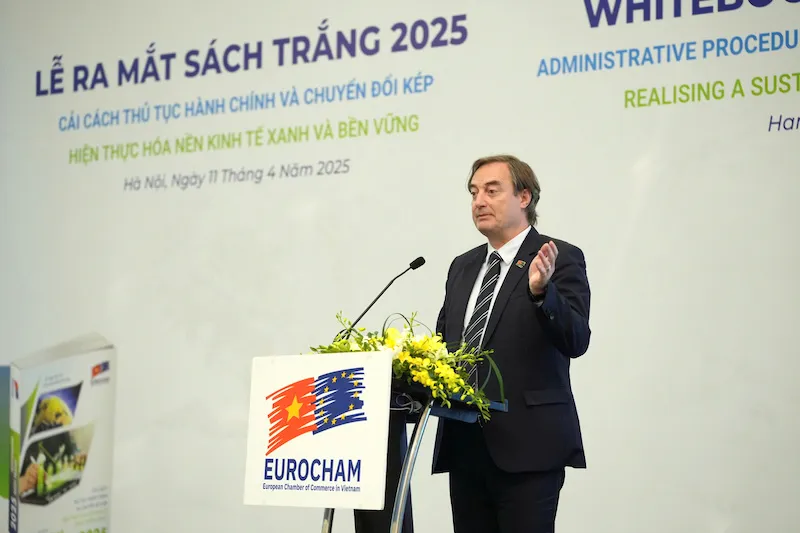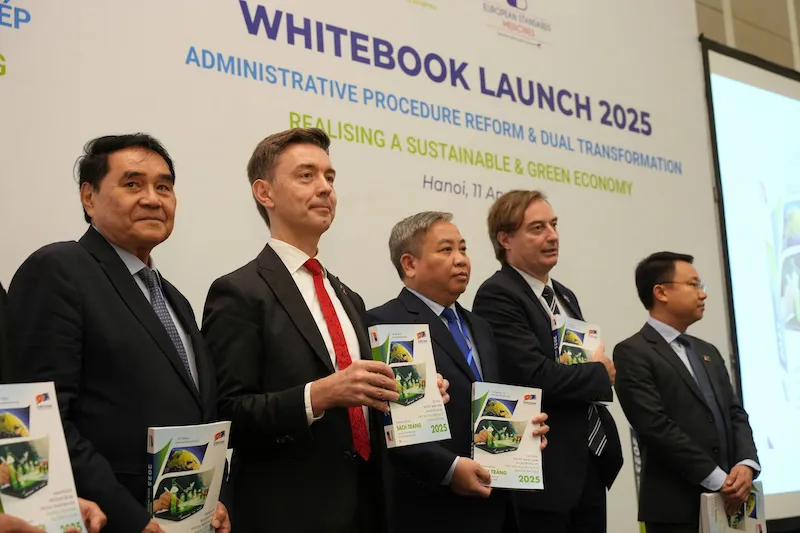EuroCham 2025 Whitebook urges key reforms for EU-Vietnam growth
EuroCham Vietnam’s 2025 Whitebook sets the stage for deeper EU-Vietnam economic ties with strategic policy recommendations to strengthen resilience and attract investment.
THE HANOI TIMES — The European Chamber of Commerce in Vietnam (EuroCham Vietnam) on April 11 in Hanoi launched the 16th edition of its Whitebook, presenting a focused reform agenda under the theme "Must-Win Battles."
This strategic framework outlines urgent policy priorities aimed at improving Vietnam’s economic resilience, boosting its global competitiveness, and deepening its alignment with the European Union.
The 2025 Whitebook serves as a timely call to action. While most European firms operating in Vietnam have not yet altered their investment plans, the demand for decisive and timely reforms has grown. Businesses are looking to the government to protect competitiveness and maintain investor confidence in an increasingly volatile global environment.

Bruno Jaspaert, EuroCham Vietnam Chairman, delivers his speech at the 2025 Whitebook Launch held on April 11. Photos: EuroCham Vietnam
At the launch, EuroCham Vietnam Chairman Bruno Jaspaert emphasized that Vietnam’s long-term ambitions must be supported by strategic and balanced partnerships.
“In this moment of global flux, Vietnam’s bamboo diplomacy must be grounded in long-term and balanced economic alliances,” he said. “The European business community, represented by EuroCham, is here for the long haul. Our Whitebook offers pragmatic solutions drawn from real business experience.”
He noted that despite global headwinds, Vietnam’s target of 8% GDP growth for 2025 remains unchanged. “To achieve it, Vietnam must focus on reinforcing internal strengths while maximizing the benefits of its external partnerships,” Jaspaert added.
Focus areas: Must-Win Battles
For the first time, EuroCham Vietnam has introduced a cross-sectoral strategic framework that identifies five core areas for immediate reform: entry visa policy, immigration and airport infrastructure, work permit processes, VAT [value-added tax] refunds, and customs procedures. These challenges, frequently cited by businesses across industries, represent fundamental barriers to investment and day-to-day operations.
Tackling these bottlenecks would improve ease of doing business, reduce unnecessary administrative burdens, and create a more attractive environment for both existing and potential investors, EuroCham said.
In addition to these cross-cutting priorities, the Whitebook compiles recommendations from 19 Sector Committees across industries, including digital economy, green finance, agriculture, healthcare, and energy. Each chapter contains actionable policy proposals grounded in direct feedback from businesses operating in Vietnam, from agile startups to large multinationals.

Representatives of the European Chamber of Commerce in Vietnam present the 2025 Whitebook at the launch ceremony on April 11.
Building a semiconductor hub
One of the standout sectors in this year’s Whitebook is the semiconductor industry. Bruno Sivanandan, Co-Chair of EuroCham’s Digital Sector Committee, noted that Vietnam’s ambition to become a globally competitive semiconductor hub will require urgent investment in talent, infrastructure, and policy coherence.
He outlined the need to train 50,000 semiconductor professionals by 2030, expand research and development capacity, and ensure access to advanced chip technologies. Harmonizing Vietnam's regulations with EU standards, particularly in data protection, intellectual property rights, and environmental sustainability, is equally important.
“Vietnam wants to lead in semiconductor production, and Europe is seeking to diversify its supply chains. There is clear ground for cooperation,” Sivanandan said. “Private companies are already exploring opportunities, but the right conditions must be in place first. This includes energy availability, skilled human capital, and legal protections," he added.
He also stressed the importance of establishing a digital partnership between Vietnam and the EU, similar to existing agreements with Singapore and South Korea. He described Vietnam's existing tech champions as valuable assets that can anchor a more sophisticated digital ecosystem.
Sivanandan said that regulatory complexity remains a concern for European investors. He pointed to European Commission-backed technical programs that are helping Vietnam harmonize regulations with EU standards and noted that EuroCham is well-positioned to bridge the gap between business and government.
A partnership for the future
The strength of the EU-Vietnam partnership was a recurring theme throughout the event. EU Ambassador to Vietnam Julien Guerrier said: “Free and fair trade is in Europe’s DNA and is the backbone of our prosperity and competitiveness. The EU is determined to work with Vietnam to navigate today’s economic challenges.”
Looking ahead to the fifth anniversary of the EU-Vietnam Free Trade Agreement (EVFTA), Ambassador Guerrier called for renewed ambition and implementation. “The EVFTA has demonstrated how trade and investment flows can grow when we build on a solid framework. We must make full use of this agreement to unlock its full potential,” he said.
As Vietnam continues to navigate a changing economic landscape, the Whitebook 2025 offers both a roadmap and a reaffirmation of European business commitment.












